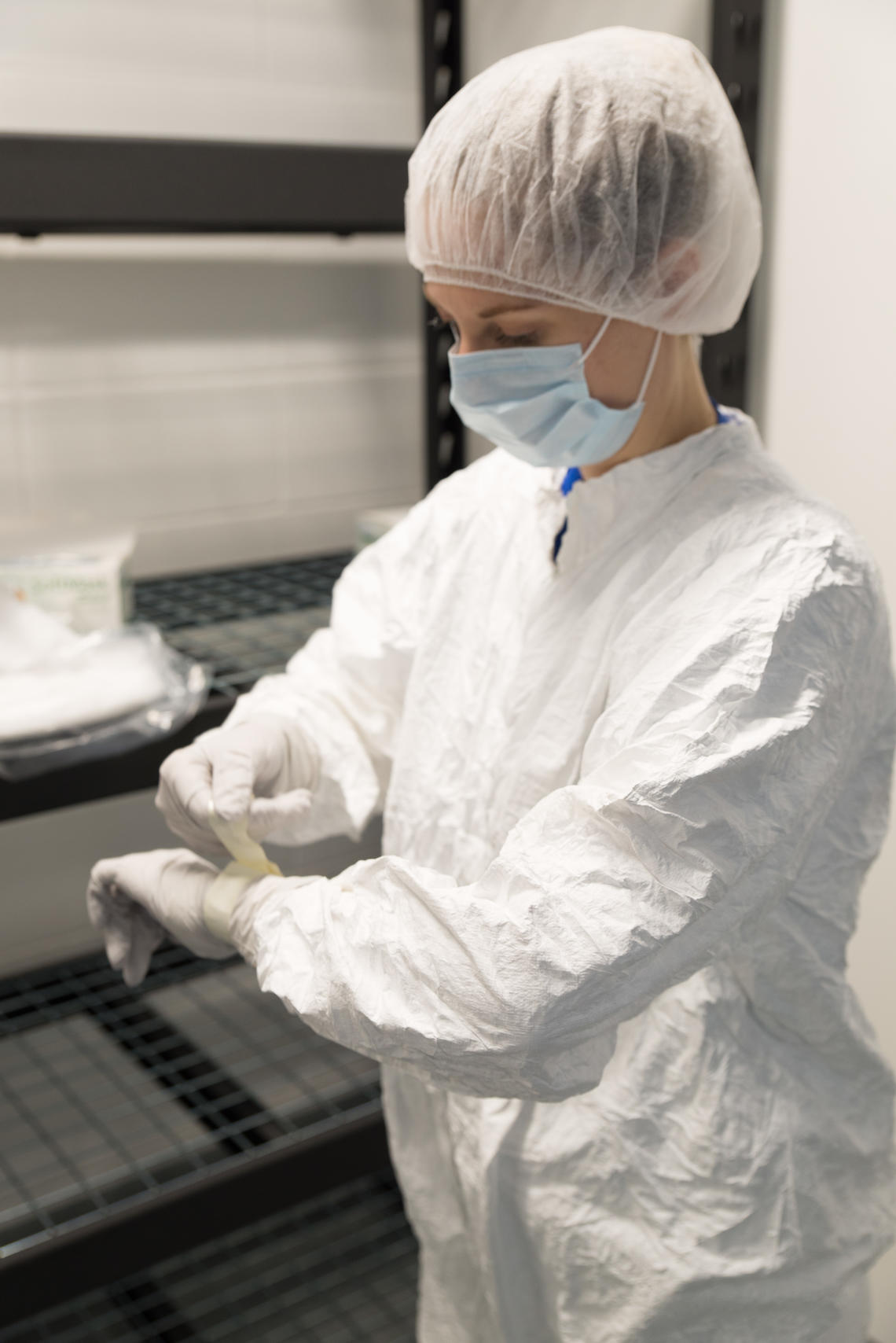Nov. 9, 2017
Only those who love science, like showering frequently and have good bladder control need apply

Excellent bladder control isn’t usually something you think about when you’re applying for a job, but if you want to work at the germ-free facility at the University of Calgary’s International Microbiome Centre (IMC), that skill is essential.
The germ-free facility doesn’t have a bathroom. There is one nearby, but leaving to use it triggers a long series of steps.
There is only one way into the facility and one way out (except in the event of an emergency). You can’t leave through the same door you came in.
When you arrive for work, you walk into a change room and remove your clothing. Next, you step into a shower. A typical shower includes a 90-second scrub down, and shampooing your hair. You also must use crème rinse. This step is important, because germs are less likely to attach to your hair if you use conditioner.
Once you’re squeaky clean, you step out of the shower on the opposite side into a new room to towel off and dress in sterilized scrubs. Then you pop into another room to complete your outfit, which includes a Tyvek suit, gloves, mask, hair net, and clogs. \ Proceed through the next door and voila, you’re at the office.
If you have to go to the bathroom, you have to walk all the way through the facility to the exit door, use the bathroom, and start the process all over again, another shower, new scrubs, etc.
On top of that, you can’t bring your lunch, a snack, or your morning coffee into the workplace. Team members sterilize all materials coming into the facility; sterilizing salads and sandwiches isn’t possible. Technicians even sterilize your cellphone each time you enter.

Your outfit includes a Tyvek suit, gloves, mask, hair net, and clogs at the IMC.
You can’t wear rings; a ring might puncture the gloves you’re wearing, and the specialized gloves hooked up to the isolation units containing the germ-free mice. A hole in the isolator or gloves would allow a doorway for microorganisms to enter.
Despite the unique hurdles employees face daily to work in the germ-free lab, people from around the world are applying to be part of this team.
Aline Ignacio, a visiting PhD student, came all the way from Brazil. Ignacio decided she wanted to attend UCalgary after hearing a talk Kathy McCoy, the director of the IMC at the Cumming School of Medicine, gave about her research and the new germ-free facility. “I felt it was a good opportunity to learn something that we don’t have in Brazil at this level.” Ignacio says. “I’m interested in the relationship between the microbiota and the immune system, how our immune system recognizes bacteria and the healthy versus unhealthy state.”
Regula Burkhard, PhD, who is working as a postdoc, came from Switzerland. “After I learned what kind of research Kathy McCoy and the team at UCalgary are doing, I realized the unique opportunities of the IMC. To follow my longstanding interest in immunity based research, I decided to move to Calgary.” Burkhard says. “UCalgary has one of largest germ-free facilities in the whole world with state-of-the-art equipment allowing for cutting edge research.”
Nathan Fitzsimmons, BSc’10, didn’t have to travel as far as the others. He moved one building away, joining IMC from the Clara Christie Centre for Mouse Genomics. Fitzsimmons will take his experience as an animal technician for 10 years to a new level.
“For me, it was the excitement of being involved in an area of research in a field that’s continuing to grow,” Fitzsimmons says. “It’s a big project to get up and running, there’s a lot of set up, new equipment to learn, it’s never boring. I can see myself staying here for quite a while.” Fitzsimmons is completing an undergrad in computer science; he did his first degree in biology.
